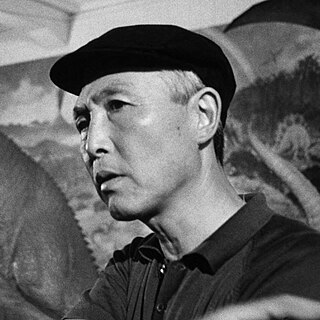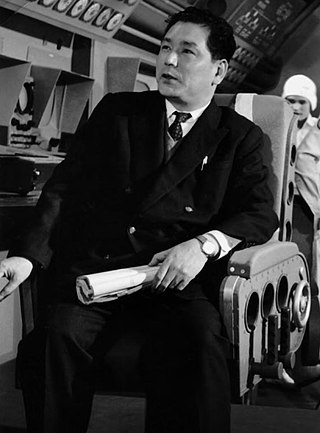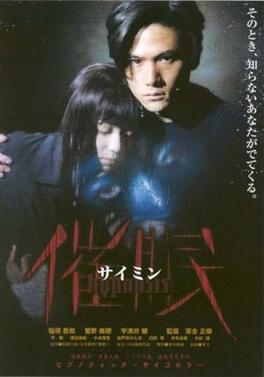| Rank | Title | Gross |
|---|---|---|
| 1 | Princess Mononoke | ¥11.3 billion |
| 2 | The End of Evangelion | ¥2.47 billion |
| 3 | Lost Paradise | ¥2.30 billion |
A list of films released in Japan in 1997 (see 1997 in film).

Ishirō Honda was a Japanese filmmaker who directed 46 feature films in a career spanning five decades. He is acknowledged as the most internationally successful Japanese filmmaker prior to Hayao Miyazaki and one of the founders of modern disaster film, with his films having a significant influence on the film industry. Despite directing many drama, war, documentary, and comedy films, Honda is best remembered for directing and co-creating the kaiju genre with special effects director Eiji Tsuburaya.

Invasion of Astro-Monster is a 1965 kaiju film directed by Ishirō Honda, with special effects by Eiji Tsuburaya. It is the sixth film in the Godzilla franchise and Shōwa period. The film was a Japanese-American co-production; it was the second collaboration between Toho Co., Ltd. and UPA. The film stars Akira Takarada, Nick Adams, Kumi Mizuno, Akira Kubo, and Yoshio Tsuchiya, with Haruo Nakajima as Godzilla, Masaki Shinohara as Rodan, and Shoichi Hirose as King Ghidorah. In the film, aliens plead with humanity to borrow Godzilla and Rodan to defeat Ghidorah, only to betray the humans and unleash the monsters on the Earth.

Ghidorah, the Three-Headed Monster is a 1964 Japanese kaiju film directed by Ishirō Honda, with special effects by Eiji Tsuburaya. Produced and distributed by Toho Co., Ltd., it is the fifth film in the Godzilla franchise, and was the second Godzilla film produced that year, after Mothra vs. Godzilla. The film stars Yosuke Natsuki, Hiroshi Koizumi, Akiko Wakabayashi, with Haruo Nakajima as Godzilla, Masanori Shinohara as Rodan, and Shoichi Hirose as King Ghidorah. In the film, an extraterrestrial from Venus, possessing the body of a princess, warns humanity of the pending destruction by the alien-dragon Ghidorah, with Godzilla, Rodan, and Mothra being their last hope for survival.

Tomoyuki "Yūkō" Tanaka was a Japanese film producer. Widely regarded as the creator of the Godzilla franchise, he produced most of the installments in the series, beginning in 1954 with Godzilla and ending in 1995 with Godzilla vs. Destoroyah. He was one of the most prolific Japanese producers of all time, having worked on more than 200 films, including over 80 tokusatsu films.
A film series or movie series is a collection of related films in succession that share the same fictional universe, or are marketed as a series.
Masayuki Ochiai is a Japanese film director. His films include Kansen and Saimin.

Saimin is a 1999 Japanese horror film. The film is directed by Masayuki Ochiai and is based on a novel by Keisuke Matsuoka. A string of suicides prove to be linked. The death of a young athlete, a groom at his wedding and an elderly man celebrating his wife's birthday. All three of these males have mentioned a "green monkey" before their death. The psychologist Saga, played by Goro Inagaki investigates this case. A young psychiatrist teams up with him to formulate the theory that includes the element of hypnosis.

Parasite Eve is a 1997 Japanese science fiction film that was directed by Masayuki Ochiai and is based on the 1995 novel Parasite Eve by Hideaki Sena. Kiyomi, the wife of Toshiaki Nagashima, is left brain dead after a traffic accident on the day of their first wedding anniversary. Nagashima attempts to make Kiyomi live again by making a deal with a doctor who wants to harvest Kiyomi's kidneys for transplanting into a young girl in the same hospital. Nagashima agrees on the condition that he can have his wife's liver. While Nagashima experiments with the organ, the doctor finds one night the samples have emerged as a gelatinous form in the form of Toshiaki's dead wife and reveal themselves as an organization of sentient mitochondria that are bent on making a new species that will wipe out humanity.

Eiji Tsuburaya (1901–1970) was a Japanese special effects director and filmmaker who worked on roughly 250 films throughout his five-decade career. Having pioneered and popularized the special effects sector of the Japanese film industry, he is popularly known as the "Father of Tokusatsu". Tsuburaya started his career in the Japanese film industry as a cinematographer for several successful dramas and jidaigeki films in the early 1920s. His directorial debut was the propaganda documentary film Three Thousand Miles Across the Equator, which he filmed in the Pacific Ocean on the Asama for most of 1935. Following the completion of photography on this film, he worked as the cinematographer and had his debut as special effects director on Princess Kaguya (1935). It was one of Japan's first major productions to feature special effects. The next year, Tsuburaya made his dramatic directorial debut with the release of Folk Song Collection: Oichi of Torioi Village and had substantial success staging the special effects for Arnold Fanck's The Daughter of the Samurai.